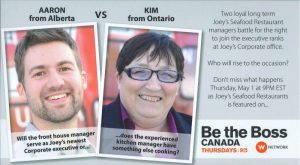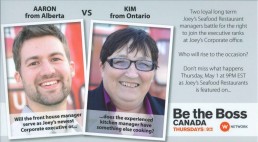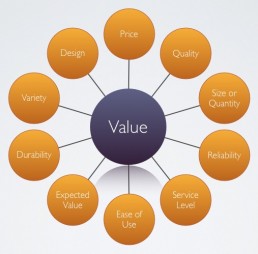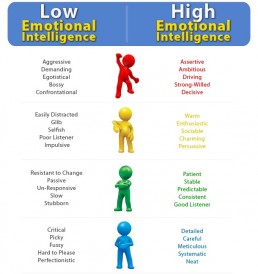New Growth - Joeys Franchise Group
 The great thing about franchising is bringing on new stores. It is such an exciting time for both the Franchise Partner and the Franchisor. We are excited to announce a few new store openings in Calgary. Two new Joeys Urban’s, one at 8118 Beddington Blvd. NW and one at 4501 17th Avenue SE . We also have a new MVP Modern Barbers in Calgary this week at 34 Edgedale Drive NW, in the community of Edgemont across from the World Health Centre.
The great thing about franchising is bringing on new stores. It is such an exciting time for both the Franchise Partner and the Franchisor. We are excited to announce a few new store openings in Calgary. Two new Joeys Urban’s, one at 8118 Beddington Blvd. NW and one at 4501 17th Avenue SE . We also have a new MVP Modern Barbers in Calgary this week at 34 Edgedale Drive NW, in the community of Edgemont across from the World Health Centre.
Join us as part of one of our great franchise systems; Joeys Urban, Joeys Restaurants , MVP Modern Barbers, Homes & Land Canada
Be The Boss Canada - Reflection
http://www.wnetwork.com/shows/be-boss-canada/clips
To anyone and everyone who may have seen Be The Boss Canada last night.
I was incredibly proud of both Aaron and Kim. They were thrown into situations in the TV show where they would purposely fail by the producers. Joey's really did not have any input on the challenges in anyway. Some of the yelling scenes were actually shot and acted out a few times. Ironic to me, because I loath yelling and completely understand how it makes an individual feel, especially when from a 'leader'.
Please do not use the TV show as a barometer of our restaurants or the great people who own and manage them. We have a tremendous team of Franchise Partners who work tirelessly day in and day out to provide our great food and service to our wonderful guests. We are very proud of the company Joe has established and the the leader that he is to us. Comments from a few, sadden me, in that I may have failed Joe by being misunderstood in the role the show had me play.
I hope you can understand that the show, was a show. I played a role in that show, it is not a true reflection of me or Joey's. We are a group who appreciates our employees, our Franchise Partners and understand that our success is merely a by-product of their success.
We all had a great deal of fun filming this show and it was an honour for me to be asked to represent our Brand.
Sincerely,
Rob Hilditch, aka Joey Franchise
Be the Boss Canada - Joey's

Be sure to check out our episode on Be the Boss Canada, Thursday May 1st on the WNetwork
See the preview here; Be the Boss Canada – Joey’s
The Common Purpose
 “Leadership begins with goals. When the followers know what the goals are, everyone understands the importance of their own role for the common purpose.”
“Leadership begins with goals. When the followers know what the goals are, everyone understands the importance of their own role for the common purpose.”
The quote is from a former military general and he knows a little bit about the ‘common purpose’. When you are looking for a franchise system to buy into, you should be asking them the same question. What is their common purpose?
We all know it’s to make money, right? But what else do YOU value? What else are you looking for? Make sure when you are asking the Franchisor questions about their system that you include open ended questions, get them talking, learn about the people who control your fate. Can you trust them? Do you like them? Can you see yourself being their partner for ten or more years?
10 Management Lessons from 7-Eleven and Undercover Boss

With our upcoming episode on Be the Boss Canada airing May 1st, we thought we would share some management lessons fromour favorite episode of it’s sister show Undercover Boss. (Pay close attention to #7)
As the largest convenience store chain in the world, we think of 7-Eleven as those bright little stores with drinks and snacks, not a place to gain management insight. Well, with 36,000 stores in 18 countries and over 30,000 employees to support them, the operational and organizational challenges of this unique company are extraordinary. Not only that, but the company’s owned by a Japanese holding company, it’s headquartered in Dallas, and it’s run by a West Point graduate originally from Chicago. Talk about culture clash! That said, the parent company, Seven & I Holdings Co., Ltd., gives chief executive Joe DePinto (pictured) remarkably free reign. Since taking over the top job in 2005, DePinto has introduced and deployed a company-wide cultural shift based on the principals of “Servant Leadership” and “The 7-Eleven Way.”Whatever that means, it seems to be working. As evidence, here are 10 Management Lessons from this week’s Undercover Boss:
- Think synergy. In 1927, Joe C. Thompson, an employee of Southland Ice Company, came up with the idea to sell milk, bread, and eggs from an ice dock he managed. The ice preserved the food and, well, the rest is history. Synergy is fundamental to the 7-Eleven story.
- Continuous improvement is key. DePinto tells his leadership team, “I’ll be focusing on spending time in the field, where the rubber meets the road. I’m going to see what we’re not doing well, and that’s only going to make us better in the long run.” I’m sure Joe knows the Japanese word “kaizen,” which refers to the management principal of continuous improvement.
- A fresh set of eyes can see missed opportunities. In the show, one of the chain’s highest grossing stores had lights that had been out for some time, a potential safety hazard. Maintenance support said it could take up to a month to fix. Question: shouldn’t higher-producing stores get higher priority support?
- Employees can inspire management. Through his hard work, can-do attitude, and passion for the job, Igor, an immigrant from Kazakhstan who drives a distribution truck, actually inspires Joe to be a better executive.
- Many great leaders started at the bottom. DePinto comes from a blue-collar family. After West Point, he worked his way up at PepsiCo. My path was similar. You always hear people complaining about lack of opportunities. I think that’s a load of bull.
- Communications is always a challenge. Far-flung operations and thousands of franchisees compound the challenge of communicating programs and messages across a vast network of stores. During the show, one store routinely trashed day-old bakery items that were supposed to go to charity.
- Replicate what works. One store on Long Island sells more coffee – 2500 cups a day – than any other location. Danny, Joe’s undercover alter ego, learns that the store manager, Delores, knows virtually all her customers by name. Do you know all your customers that well? Delores Undercover Boss Segment
- An army runs on infrastructure and logistics. At West Point, DePinto was trained to ensure that equipment is always working and “mission ready.” Behind the scenes, 7-Eleven’s sprawling distribution and support centers and plants that make enormous amounts of perishable foods are a testament to his operational training.
- There are tricks to doing just about anything. On a donut production line, “Danny” couldn’t keep up with the pace of a conveyor belt until trainer Phil showed him a trick to doing it more efficiently. That’s the case with every task in business, no matter how big and strategic or small and menial.
- Engineers make great executives. DePinto, Larry O’Donnell fromWaste Management, and a healthy percentage of executives from the technology industry all started as engineers, as did I. Sure, I’ve known quite a few dysfunctional ones, but by and large, they make competent executives. Any ideas on why that is?
Emotional Intelligence
 Emotional Intelligence
Emotional Intelligence
Developing strong “people skills”
We probably all know people, either at work or in our personal lives, who are really good listeners. No matter what kind of situation we’re in, they always seem to know just what to say – and how to say it – so that we’re not offended or upset. They’re caring and considerate, and even if we don’t find a solution to our problem, we usually leave feeling more hopeful and optimistic.
We probably also know people who are masters at managing their emotions. They don’t get angry in stressful situations. Instead, they have the ability to look at a problem and calmly find a solution. They’re excellent decision makers, and they know when to trust their intuition. Regardless of their strengths, however, they’re usually willing to look at themselves honestly. They take criticism well, and they know when to use it to improve their performance.
People like this have a high degree of emotional intelligence, or EI. They know themselves very well, and they’re also able to sense the emotional needs of others.
Would you like to be more like this?
As more and more people accept that emotional intelligence is just as important to professional success as technical ability, organizations are increasingly using EI when they hire and promote.
For example, one large cosmetics company recently revised their hiring process for salespeople to choose candidates based on emotional intelligence. The result? Salespeople hired with the new system have sold, on average, $91,000 more than salespeople selected under the old system. There has also been significantly lower staff turnover among the group chosen for their emotional intelligence.
So, what exactly is emotional intelligence, and what can you do to improve yours?
What is Emotional Intelligence?
We all have different personalities, different wants and needs, and different ways of showing our emotions. Navigating through this all takes tact and cleverness – especially if we hope to succeed in life. This is where emotional intelligence becomes important.
Emotional intelligence is the ability to recognize your emotions, understand what they’re telling you, and realize how your emotions affect people around you. Emotional intelligence also involves your perception of others: when you understand how they feel, this allows you to manage relationships more effectively.
People with high emotional intelligence are usually successful in most things they do. Why? Because they’re the ones that others want on their team. When people with high EI send an email, it gets answered. When they need help, they get it. Because they make others feel good, they go through life much more easily than people who are easily angered or upset.
Characteristics of Emotional Intelligence
Daniel Goleman, an American psychologist, developed a framework of five elements that define emotional intelligence:
- Self-Awareness – People with high emotional intelligence are usually very self-aware. They understand their emotions, and because of this, they don’t let their feelings rule them. They’re confident – because they trust their intuition and don’t let their emotions get out of control.They’re also willing to take an honest look at themselves. They know their strengths and weaknesses, and they work on these areas so they can perform better. Many people believe that this self-awareness is the most important part of emotional intelligence.
- Self-Regulation – This is the ability to control emotions and impulses. People who self-regulate typically don’t allow themselves to become too angry or jealous, and they don’t make impulsive, careless decisions. They think before they act. Characteristics of self-regulation are thoughtfulness, comfort with change, integrity, and the ability to say no.
- Motivation – People with a high degree of emotional intelligence are usually motivated. They’re willing to defer immediate results for long-term success. They’re highly productive, love a challenge, and are very effective in whatever they do.
- Empathy – This is perhaps the second-most important element of emotional intelligence. Empathy is the ability to identify with and understand the wants, needs, and viewpoints of those around you. People with empathy are good at recognizing the feelings of others, even when those feelings may not be obvious. As a result, empathetic people are usually excellent at managing relationships, listening, and relating to others. They avoid stereotyping and judging too quickly, and they live their lives in a very open, honest way.
- Social Skills – It’s usually easy to talk to and like people with good social skills, another sign of high emotional intelligence. Those with strong social skills are typically team players. Rather than focus on their own success first, they help others develop and shine. They can manage disputes, are excellent communicators, and are masters at building and maintaining relationships.
As you’ve probably determined, emotional intelligence can be a key to success in your life – especially in your career. The ability to manage people and relationships is very important in all leaders, so developing and using youremotional intelligence can be a good way to show others the leader inside of you.
How to Improve Your Emotional Intelligence
The good news is that emotional intelligence CAN be taught and developed. Many books and tests are available to help you determine your current EI, and identify where you may need to do some work. You can also use these tips:
- Observe how you react to people. Do you rush to judgment before you know all of the facts? Do you stereotype? Look honestly at how you think and interact with other people. Try to put yourself in their place, and be more open and accepting of their perspectives and needs.
- Look at your work environment. Do you seek attention for your accomplishments? Humility can be a wonderful quality, and it doesn’t mean that you’re shy or lack self-confidence. When you practice humility, you say that you know what you did, and you can be quietly confident about it. Give others a chance to shine – put the focus on them, and don’t worry too much about getting praise for yourself.
- Do a self-evaluation. What are your weaknesses? Are you willing to accept that you’re not perfect and that you could work on some areas to make yourself a better person? Have the courage to look at yourself honestly – it can change your life.
- Examine how you react to stressful situations. Do you become upset every time there’s a delay or something doesn’t happen the way you want? Do you blame others or become angry at them, even when it’s not their fault? The ability to stay calm and in control in difficult situations is highly valued – in the business world and outside it. Keep your emotions under control when things go wrong.
- Take responsibility for your actions. If you hurt someone’s feelings, apologize directly – don’t ignore what you did or avoid the person. People are usually more willing to forgive and forget if you make an honest attempt to make things right.
- Examine how your actions will affect others – before you take those actions. If your decision will impact others, put yourself in their place. How will they feel if you do this? Would you want that experience? If you must take the action, how can you help others deal with the effects?
Key Points
Although “regular” intelligence is important to success in life, emotional intelligence is key to relating well to others and achieving your goals. Many people believe that emotional intelligence is at least as important as regular intelligence, and many companies now use EI testing to hire new staff.
Emotional intelligence is an awareness of your actions and feelings – and how they affect those around you. It also means that you value others, listen to their wants and needs, and are able to empathize or identify with them on many different levels.
Franchise Advice - Purchasing Power
 Purchasing Power. Does the franchisor use the collective buying power of the total system to get discounts on supplies and inventory beyond what an independent operator could achieve? This factor is one of the biggest advantages of joining a well-run franchise systemand should offset much of the upfront fees associated with being a franchisee. Make sure to ask for specific examples, pro or con, in terms of the franchisor’s attempt to leverage this franchise system advantage.
Purchasing Power. Does the franchisor use the collective buying power of the total system to get discounts on supplies and inventory beyond what an independent operator could achieve? This factor is one of the biggest advantages of joining a well-run franchise systemand should offset much of the upfront fees associated with being a franchisee. Make sure to ask for specific examples, pro or con, in terms of the franchisor’s attempt to leverage this franchise system advantage.
At Joey’s Franchise Group, our collective purchasing power comes from vertically integrating our whole system. Our in-house purchasing team not only buys for our system but leverages our buying for other sources as well. This means we’re not just buying products for our system from our vendors but that we’re buying for multiple customers from our vendors. Buy more, pay less.
We’ve also integrated our printing, marketing and development requirements, lowering the standards costs our franchise partners pay for our core services.
Rob Hilditch – VP of Business Development
joeys.joeys urban.MVP modern barbers.homes & land magazine
The Urban Decker - Joey's Food Truck

 Coming Soon! To Western Canada with its launch at the 2014 Calgary Stampede.
Coming Soon! To Western Canada with its launch at the 2014 Calgary Stampede.
We took an original 1965 Leyland Atlantean, British Double Decker Bus and converted it into the craziest food truck around. We’ve been busy outfitting the bus with the latest in commercial kitchen equipment to serve up our Famous Fish & Chips, #epicfishtacos, Deep Fried Sushi and our Frank’s RedHot Vicious Fish on a stick!.
PRIDE.
Our motivation at Joey's Franchise Group, with a little inspiration from Simon Sinek.
P – Passion’s
R – Required
I – IN
D – Delivering
E – Excellence
1. Take an unconventional perspective
2. Keep it Simple
3. Share
4. Silver line IT
5. Make long term progress
The goal is not necessarily to fix things that are broken but to amplify the things that work!
Rob Hilditch, a.k.a. Joey Franchise
The Success Indicator
 People measure success in different ways. Potential franchisees measure it in vastly different ways. For the last few years I have been using this simple categorized system by Mary Ellen Tribby (attached picture). I use these indicators in the picture from each side to ask open ended questions that will show me which side of the scale a potential franchisee will fall on.
People measure success in different ways. Potential franchisees measure it in vastly different ways. For the last few years I have been using this simple categorized system by Mary Ellen Tribby (attached picture). I use these indicators in the picture from each side to ask open ended questions that will show me which side of the scale a potential franchisee will fall on.
Simple, yet elegant, and so far, accurate. Keep your system simple and straight forward. Complicating your processes and systems only makes it more difficult for you and franchisees potential success.
Rob Hilditch
Joey's Restaurants | Joey's Urban | MVP Moderb Barbers | Homes & Land Magazine







